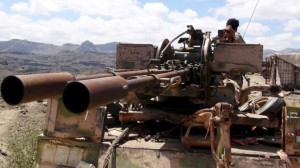
Riyadh authorities were extremely content for the fact that Pakistan would embark on their military venture due to the fact that it’s the only Muslim country in the coalition that possesses nuclear weapons, which, according to the Saudi monarchy, will not only be a deterrent, but may also play a decisive role in the unfolding crisis in the Middle East Without a glimpse of a doubt, the step that was taken by Islamabad was a predictable one, due to the fact that Saudi Arabia and Pakistan share close economic ties, with Riyadh providing considerable funding to its ally in return for the military training supervised by Pakistani officers.
At the same time, Pakistani authorities understand that their interference in the Yemeni conflict may provoke a negative reaction from Iran. The Islamic Republic is looming over Pakistan’s borders and it has has the ability to influence 40 million Shia Muslims living in Pakistan. Additionally, in recent years the Pakistani army has been busy fighting the Pakistani Taliban in the north-west part of the country, since they have been presenting a major threat to the country’s national security. That is why Pakistani authorities were particularly careful in their wording, stating that Islamabad is not willing to affect the spread of the conflict that is now bringing the Muslim world apart directly, choosing diplomacy over brute force.
Nevertheless, the ongoing conflict in Yemen has been set aflame, putting the stability of the whole Middle Eastern region to the test. The regional ambitions of the “Shia arc” are now being suppressed by the missiles of the Sunni coalition, and the actions of the Islamic Revolutionary Guard deployed in Syria and Iraq are to be answered by 150 thousand Saudi soldiers mobilized for the operation in Yemen. Those soldiers would be supported by tens of thousands of new recruits from the countries of the Sunni coalition . Regional players have immediately abandoned their previous political “alliances” along with the common enemies like Al Qaeda and ISIL. The steps Iran took against the Islamists and the fact that the Houthis themselves were fighting ISIL is of little interest to the West and Saudi Arabia now.
By forming an “international coalition”, Saudi Arabia, along with its Sunni and Western allies have sent a clear message to the Muslim world and the whole international community, that the fight against international terrorism and Jihadism is nothing in comparison to the sectarian ambitions of Riyadh. But this war wouldn’t be about its own interpretation of the Koran that Saudi Arabia defends, it would be driven by purely pragmatic reasons that can only lead to a lethal face off between the countries of the region.
Will there be winner? – For sure, but they would be nowhere to be found in the Arab or Muslim World who will lose their best sons in this war. Traditionally, Western military contractors that have already succeeded in flooding the region with guns would be the ones to pop champagne bottles. Israelis will also have a big smile on their faces due to the fact that the opposition within the Muslim world will only strengthen Israel’s regional position.
That is why the appeals to listen to reason that Iran has been making along with the former President of Yemen Ali Abdullah Saleh must be heard. A cease-fire and the consequent resumption of dialogue between opposing Yemeni parties – is the only way of preventing a total regional war.
Valery Kulikov, political analyst, exclusively for the online magazine “New Eastern Outlook”.
